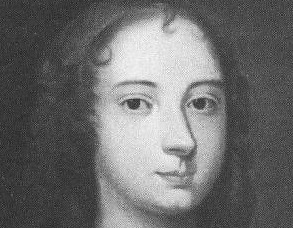Separations, Fears and Bereavements
Brilliana Harley
Writing to her son Edward from Brampton Bryan Castle, December 1642, expressing her fears both for herself and for him.
My heart has been in no rest since you went. I confess I was never so full of sorrow. I fear the provision of corn and malt will not hold out, if this continue; and they say they will burn my barns; and my fear is that they will place soldiers so near me that there will be no going out. My comfort is that you are not with me, lest they should take you; but I do most dearly miss you. I wish, if it pleased God, that I were with your father. I would have write to him, but I durst not write upon paper. Deare Ned, write to me, though you write upon a piece of cloth, as this is. I pray God bless you, as I desire my own soul should be blessed.1

Portrait of Brilliana Harley
Susan Owen
A Londoner writing to her husband John in September 1643.
Most tender and dear heart, my kind affection remembered unto you. I am like never to see you more I fear, and if you ask the reason why, the reason is this, either I am afraid the Cavaliers will kill you or death will deprive you of me, being full of grief for you, which I fear will cost me my life. I do much grieve that you be so hard-hearted to me. Why could not you come home with Master Murphy on Saturday? Could not you venture as well as he? But you did it on a purpose to show your hatred to me. There is none of our neighbours with you that has a wife but Master Fletcher and Master Norwood and yourself. Everybody can come but you. I have sent one to Oxford to get a pass for you to come home, but when you come you must use your wits. I am afraid if you do not come home, I shall much dishonour God more than you can honour him. Therefore if I do miscarry, you shall answer for it. Pity me for God's sake and come home. Will nothing prevail with you? My cousin Jane is now with me and prays for your speedy return. For God's sake come home. So with my prayer for you I rest your loving wife... Susan Owen.2
Susan Rodway
Again from London, a letter to her husband Robert in November 1643. Poignantly, Robert, who was serving in Waller's army, was probably already dead when she wrote her letter, killed in the unsuccessful Parliamentarian attack on Basing Park.
Most dear and loving husband, my king love. I remember me unto you, hoping that you are good health as I am at the writing hereof. My little Willie have been sick this fortnight. I pray you to come home, if you can come safely. I do marvel that I cannot hear from you as well other neighbours do. I do desire to hear from you as soon as you can. I pray you to send me word when you do think you shall return. You do not consider I am a lone woman. I thought you would never leave me this long together, so I rest ever praying for your safest return.3
Susan Feilding
Writing to her son Basil (parliament), second earl of Denbigh, in the spring of 1643, following the death of his father William (royalist) in battle. The two men had fought on opposing sides at Edgehill the year before.
I am much comforted with receiving of your kind letter in this time of my great sorrow for the loss of my dear husband, your dear father, whose memory I shall ever keep with sorrow and a most tender affection, as he did deserve from me and all the whole world, which he did declare till his last hour, leaving so much to his memory as was possible to be merited. God make me able to overcome this my affliction. I beg of you my first born to give me the comfort of that son I do so dearly love, that satisfaction which you owe me now, which is to leave those that murdered your dear father, for what can it be called, but so which when he received his death wounds but with the saying he was for the King, there was no mercy to his grey hairs but wounds and shots, a horror to me to think of. O my dear Jesus, put it into my dear son's heart to leave that merciless way that was the death of his father, for now I think of it with horror, before with sorrow. Now is the time that God and nature claims it from you. Before you were carried away with error, but now it is hideous and monstrous. The last words your dear father spoke of you was to desire God to forgive you and to touch your heart. Let your dying father and unfortunate mother make your heart relent; let my great sorrow receive some comfort. 4
Elizabeth Feilding
Writing to her husband Basil Feilding, c.1643?
I should be glad to hear of your safe arrival at Stafford for none prays more for your safety than I do, and it is a great grief to me to have you put yourself into those great hazards you do, and to think you are to be so long from me whose only comfort you are. God, in His mercy, look upon all my afflictions, and bring you to leave these employments and to come to live at home with me, yet I hope if you continue long where you are you will send for me to you for you are not sensible of my grief now in your absence. I hope if you think it fit and convenient that you will contrive to some way that I may come to you. I have much ado to forbear coming, but I will do nothing without your consent dear heart. Let me be with you as often as you can for in your company lies the happiness of your obedient wife and servant.5
K. Lloyd
A letter to her husband Luke in February 1644. He was fighting in the parliamentarian army by summer 1644 at the latest.
I long much to hear of thy resolution, which I hope will be to go no further nor to alter thy condition any way. I hope there will be no cause for it. However, as thou tenders the life of thy poor desolate wife, go no further from her. Thou knowest the condition thou left me in, and if thou go any further I shall dispair of ever seeing thee. Therefore desire, love, let me hear that thy resolution is to stay where thou art. I hope it will be but a short time. Do not think I doubt of God's alsuffience, for I have daily experience of his delivering and forbearing mercies unto me all my life through, and especially of late days, but if you go further you must pass a great deal of danger, so must I, before we can meet again.6
Margaret Eure
Writing in November 1644 on the death in battle of her husband Colonel William Eure
I am now over run with miseries and troubles, but the greatest misfortune that could ever happen to me in this world was the death of the gallantest man that ever I knew in my life, but my comfort is that he had time to prepare him self for a better world, which I am confident he will enjoy, it was my misfortune to be from him at his death, and as the current of the times run it is a question whether I shall see any friend I have again.7

Ann Fanshawe, miniature
Ann Fanshawe
Writing in her memoir of events surrounding defeat at the battle of Worcester and her husband's capture in 1651.
I now settled myself in a lodging in Hunsdon House in London, with a heavy heart. I stayed in this lodging almost seven months, and in that time I did not go abroad seven times, but spent my time in prayers to God for the deliverance of the King and my husband, whose danger was ever before my eyes. I was seldom without the best company in the town, and sometimes my father would stay a week; for all had compassion upon my condition. I removed to Queen Street, and there in very good lodging I was upon the 24th of June delivered of a daughter. In all this time I had but four letters from your father, which made the pain I was in more difficult to bear. I went with my brother Fanshawe to Ware Park, and my sister went to Balls to my father's, both intending to meet in winter. And so indeed we did with tears, for upon the [third] day of September following was fought the battle of Worcester, when, the King being missed, and nothing of your father being dead or alive for three days heard of, it is inexpressible what affliction I was in. I neither ate nor slept, but trembled at every motion I heard, expecting the fatal news; which at last came in their newsbook, which mentioned your father a prisoner. Then, with some hopes, immediately I went to London, intending to leave my little girl Nan, the companion of my troubles, there, and so find out my husband, wheresoever he was carried; but upon my coming to London, I met a messenger from him, with a letter which advised me of his condition, and told me he was very civilly used, and said little more but that I should be in some room in Charing Cross; and he had promise from his keeper that he should rest there in my company a dinner-time... At last came the captain and a soldier with your father, who was very cheerful in appearance; who, after he had spoke and saluted me and his friends there, said, 'Pray let us not lose time, for I know not how little I have to spare. This is the chance of war - Nothing venture, nothing have; and so let us sit down and be merry whilst we may.' Then taking my hand in his, and kissing me, said, 'Cease weeping; no other thing upon earth can move me. Remember we are all at God's dispose.'8
Brilliana Harley to Edward Harley, 13 December 1642. Lewis (ed), Letters of Lady Brilliana Harley, 185-6. ↩
Susan Owen to John Owen, 5 September 1643. Quoted in Adair, By the sword divided, 104. ↩
Susan Rodway to Robert Rodway. Quoted in Fraser, The weaker vessel, 194. ↩
Susan Feilding to Basil Feilding, late April/early May 1643. Feilding (ed), Royalist father, roundhead son, 191-93. ↩
Elizabeth Feilding to Basil Feilding. Feilding (ed), Royalist father, 200. ↩
K. Lloyd to Luke Lloyd, 3 February 1644. Manuscripts of Lord Kenyon, 62. ↩
Margaret Eure, November 1644. Memoirs of the Verney family, I, 175. ↩
Fanshawe (ed), Memoirs of Ann, lady Fanshawe, 77-79. ↩
